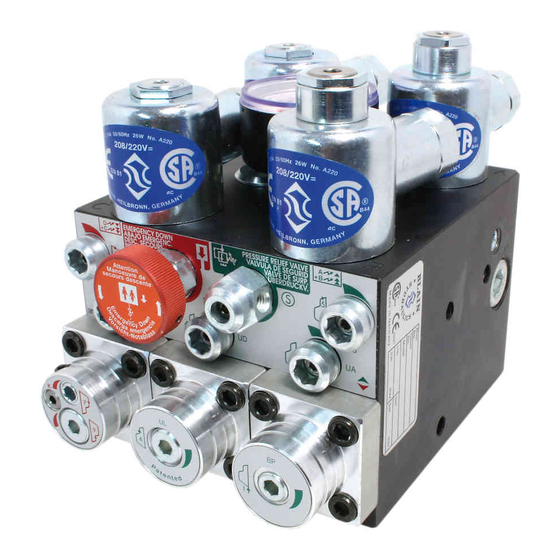Blain Hydraulics EV100 Series Servicehandleiding - Pagina 6
Blader online of download pdf Servicehandleiding voor {categorie_naam} Blain Hydraulics EV100 Series. Blain Hydraulics EV100 Series 16 pagina's. Elevator valve

EV 100 Service Manual
3. Up Deceleration
With coil B still disconnected. Energise motor and coil A (normal up-level call).
The car will travel upwards at leveling speed. Turn No. 3 in until the car starts to up level faster, then
turn No. 3 out until the original leveling speed is observed. Reconnect coil B and place a normal up call.
Observe the deceleration of the car. If it is too long, turn No. 3 out ¼ turn; if it is too short, turn No. 3 in ¼ turn.
Repeat until deceleration is satisfactory. Deceleration time should be about 2,5 secs.
5. Up Soft Stop
Disconnect coil A. Energise Motor.
The car should not move. Turn No. 5 in until the car starts upwards then turn No. 5 out until the car stops.
Reconnect coil A. Energise Pump-Motor and A. The car will travel upwards at leveling speed.
Lift A coil by hand briefly and observe the stopping of the car. If the stop is too hard turn No. 5 in ¼ turn.
If the stop is too soft, turn No. 5 out, ¼ turn. Repeat until the stop is satisfactory.
S Pressure Relief Valve
Turn S screw out until about 2 mm of the screw head is showing. Close the ball valve in the cylinder line
and open the manual lowering H to lower valve pressure down to zero. Place an up call, energising motor
and coils A and B. The relief pressure will show on the pressure gauge.
To increase the relief valve setting, turn S in.
To decrease the relief valve setting, turn S out, then open the manual lowering for ½ second with the pump
still running to release locked-in pressure, before observing the pressure gauge reading.
Down Travel (empty car)
PRE-SETTINGS
Adjustment No. 6 all the way in then 4 turns out.
Adjustment No. 7
Adjustment No. 8 all the way in then 2 turns out.
Adjustment No. 9
8. Down Deceleration
Place down call (coils C and D energised).
As the car approaches full speed, remove coil D by hand briefly from the solenoid and observe the deceleration of
the car. If the deceleration is too long, turn No. 8 out ¼ turn; if it is too short, turn No. 8 in ¼ turn.
Repeat until deceleration is satisfactory. Deceleration time should be about 2,5 secs.
6. Down Acceleration
Turn No. 6 all the way in. Place down call (coils C and D energised).
The car will not move. Turn No. 6 out slowly until the car accelerates downwards.
If the acceleration is too long, turn No. 6 out ¼ turn. If it is too short, turn No. 6 in ¼ turn.
Acceleration time should be about 2,5 secs.
7. Down Full Speed
Place down call (coils C and D energised).
Observe full down speed. Turn No. 7 in for slower, out for faster speed.
9. Down Leveling Speed
Disconnect coil C. Place down call (D energised).
Observe down leveling speed. Turn No. 9 in for slower, out for a fast down leveling speed.
Recommended speed 6 cm/sec.
H Emergency Lowering
The manually operated emergency down speed and the D coil operated down leveling speed are the same.
Down Stop
When solenoid D is de-energised with solenoid C remaining de-energised, the car will stop according to the setting
of adjustment 8 and no further adjustment will be required.
KS Slack Rope Valve
The KS is adjusted with a 3 mm Socket Key by turning the screw K in for higher pressure and out for lower
pressure. With K turned all the way in, then half a turn back out, the unloaded car should descend when the D
solenoid alone is energised. Should the car not descend, K must be backed off until the car just begins to descend,
then backed off a further half turn to ensure that with cold oil, the car can be lowered as required.
Oct 02
BLAIN HYDRAULICS GmbH Boellinger Hoefe D-74078 Heilbronn Tel. +49 7131 28 21-0 Fax +49 7131 485216 www.blain.de [email protected]
Printed in Germany
Quick adjustment
procedure
3 mm under the flange face.
level with flange face.
3 mm Socket key
5 mm
3 mm
5 mm
EN ISO 9001
4
